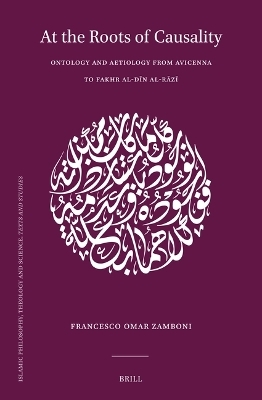
At the Roots of Causality
Brill (Verlag)
978-90-04-68486-7 (ISBN)
The book approaches the conceptual background of Avicenna's account of efficient causality, outlining the positions held by him and his early interpreters (eleventh and twelfth centuries), as well as the arguments that support those positions. The first aim of the book is to show the systematic unity of the Avicennian doctrines on ontology and aetiology, highlighting the threads connecting the two. The second aim is to investigate Avicenna’s influence over his interpreters, assessing continuities and discontinuities.
Francesco Omar Zamboni, Ph.D. (2021), Scuola Normale Superiore (Pisa), is post-doctoral researcher at the university of Jyväskylä. He has published several articles on Mediaeval Islamic metaphysics, as well as a full Italian translation of Avicenna's Ishārāt.
Acknowledgements
Introduction
1 Avicenna
2 The Avicennians: Bahmanyār, Lawkarī, Khayyām, and Sāwī
3 The Anti-Avicennians: Ghazālī, Ibn al-Malāḥimī, Shahrastānī, Masʿūdī, and Ibn Ghaylān
4 The Innovators: Abū l-Barakāt and Suhrawardī
5 The Systematiser: Fakhr al-Dīn al-Rāzī
6 The Thirteenth Century: Traditional Mutakallimūn, Post-Rāzians, Ishrāqis, and Neo-Avicennians
7 General Overview of the Study
1 Efficient Causality in Avicenna
1.1 The Subject of and the Reason for Causal Dependence
1.2 Categories of Efficient Causality
1.3 Necessitation Contra Contingent Choice
1.4 Corollaries of Efficient Causality
1.5 The Epistemic Function of Avicenna’s Aetiology
2 The Essence of Existence
2.1 Avicenna: Primitivity, Simplicity, Identity with Reality, Distinction from Quiddity
2.2 Bahmanyār, Khayyām, and Rāzī: The Rejection of Grounding and Dependent Knowability
2.3 Masʿūdī and Abū l-Barakāt: Grounding and Inferential Knowability
2.4 Ibn al-Malāḥimī: Reduction to Quiddity, Nominalism, and Extensionalisation
2.5 Debates: on Grounding
2.6 Debates: on Simplicity and Knowability
2.7 Debates: on Primitivity
3 The Universality of Existence and Mental Existence
3.1 Avicenna and the Majority: the Universality of Existence and Mental Existence
3.2 Masʿūdī and Rāzī: the Rejection of Mental Existence and the Aporia of Universality
3.3 Avicenna, Khayyām, Abū l-Barakāt, and Rāzī: the Distinction between Mental and Concrete
3.4 Debates: on Universality
3.5 Debates: on Mental Existence
4 The Conceptual Invariance of Existence
4.1 Avicenna and the Majority: Conceptual Invariance
4.2 Ibn al-Malāḥimī: Unrestricted Conceptual Variance
4.3 Shahrastānī: Restricted Conceptual Variance
4.4 Debates: on the Case for Invariance
4.5 Debates: on the Case for Variance, Unrestricted and Restricted
5 The Modulation of Existence
5.1 Avicenna and Sāwī: The Modulation of Existence by Priority and Worth
5.2 Ibn al-Malāḥimī, Shahrastānī, and Suhrawardī: the Rejection of the Modulation of Existence
5.3 Bahmanyār: Modulation by Intensity and Accidental Unity
5.4 Ibn al-Malāḥimī, Shahrastānī, Masʿūdī, and Rāzī: Essential Unity and the Rejection of Intensity
5.5 Debates: on Intensity
5.6 Debates: on the Accidentality and Essentiality of Unity
6 The Accidentality of Existence
6.1 Avicenna, Bahmanyār, Sāwī, Masʿūdī, and Rāzī: the Accidentality of Existence
6.2 Ghazālī and Ibn al-Malāḥimī: the Rejection of Distinction (Nominalism)
6.3 Khayyām, Shahrastānī, Ibn Ghaylān, and Suhrawardī: the Rejection of Concrete Reality (Conceptualism)
6.4 Abū l-Barakāt: the Rejection of Inherence
6.5 Debates: on Distinction
6.6 Debates: on Concrete Reality
6.7 Debates: on Externality
6.8 Debates: on Inherence
7 The Contingency of Existence
7.1 Avicenna: Intuitivity, Temporal Neutrality, Equidistance, Attribution to Pure Quiddity, and Concrete Reality
7.2 Bahmanyār and Lawkarī: Relativity, Modulation, and the Problem of Concrete Reality
7.3 Ghazālī and Masʿūdī: Contingency as Causal Dependence
7.4 Ibn al-Malāḥimī: Temporal Qualification and Non-equidistance
7.5 The Majority: the Rejection of Concrete Reality
7.6 Debates: on Contingency as Causal Dependence
7.7 Debates: on the Possibility of Contingency
7.8 Debates: on Equidistance
7.9 Debates: on Concrete Reality
8 The Signs of Contingency
8.1 Avicenna and the Majority: the Contingency of the Conditional and of What Comes-to-be
8.2 Ghazālī and Masʿūdī: the Insufficiency of Conditionality for Contingency
8.3 Ibn al-Malāḥimī: the Insufficiency of Composition for Contingency
8.4 Suhrawardī: the Contingency of the Imperfect and the Multipliable
8.5 Debates: on the Contingency of the Conditional
8.6 Debates: on the Contingency of What Comes-to-be
8.7 Debates: on the Contingency of the Imperfect and the Multipliable
9 The Principle of Sufficient Reason
9.1 Avicenna and the Majority: Sufficient Reason, Causal Necessitarianism, Unrestricted Applicability
9.2 Ghazālī and Ibn Ghaylān: Non-applicability to Voluntary Actions
9.3 Ibn al-Malāḥimī: the Weakening of the Principle
9.4 Shahrastānī: Possible Applicability to Divine Actions
9.5 Rāzī: the Preference for Non-applicability to Divine Actions
9.6 Debates: on the Intuitivity of Sufficient Reason
9.7 Debates: the Inferential Case for Sufficient Reason
9.8 Debates: the Case against Sufficient Reason
10 The Coexistence of Cause and Effect
10.1 Avicenna and the Majority: Coexistence as Entailed by Sufficient Reason
10.2 Rāzī: Coexistence as Distinct from Sufficient Reason
10.3 Shahrastānī: the Rejection of Coexistence with God
10.4 Ibn al-Malāḥimī, Masʿūdī: Causeless Persistence
10.5 Debates: on Coexistence
10.6 Debates: on Coexistence with God
10.7 Debates: on Causeless Persistence
11 Causal Priority
11.1 Avicenna and the Majority: Causal Priority as Existential Priority
11.2 Rāzī: the Problematisation of Causal Priority and Its Corollaries
11.3 Debates: on Causal Priority
11.4 Debates: on Self-Causation
11.5 Debates: on Essential Coming-to-be
Conclusion
Bibliography
Index
| Erscheinungsdatum | 10.10.2023 |
|---|---|
| Reihe/Serie | Islamic Philosophy, Theology and Science. Texts and Studies ; 124 |
| Verlagsort | Leiden |
| Sprache | englisch |
| Maße | 155 x 235 mm |
| Gewicht | 719 g |
| Themenwelt | Geisteswissenschaften ► Philosophie ► Östliche Philosophie |
| ISBN-10 | 90-04-68486-7 / 9004684867 |
| ISBN-13 | 978-90-04-68486-7 / 9789004684867 |
| Zustand | Neuware |
| Haben Sie eine Frage zum Produkt? |
aus dem Bereich


